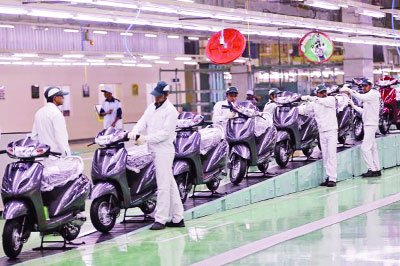At the launch of India’s first scooter that meets Bharat Stage 6 emission norms, Honda Motorcycle and Scooter India (HMSI) Chief Executive Officer, Minoru Kato mentioned that the Japanese company, India’s largest scooter manufacturer was ‘putting on hold any further investment decisions until they got some clarity on the government’s proposals around electrification of sub-150cc two-wheelers.’ This is in light of a recent proposal in a report released by the Niti Ayog that has proposed that all sub-1500 two-wheelers in India get run on electricity by 2023. Kato made it clear that while electrification was the future, to moveto electric so soon after implementing new Bharat Stage 6 emission norms was not a wise move, “We and many of our suppliers have made very heavy investments in moving to BS6.”
In doing so, Kato echoed the sentiments expressed by Pawan Munjal, CEO, Hero Motocorp and Rajiv Bajaj, Managing Director, Bajaj Auto. India has moved from nationwide Bharat Stage 4 (BS4) emission norms to BS6 emission norms in just three years. Europe moved from the roughly comparable Euro 3 to Euro 5 in thirteen years. two -wheeler manufacturers in India have privately stated that this rapid move has led to them diverting huge amounts of engineering resources into BS6 engine development. The stricter emission norms will mean that most, if not all two-wheelers will have to use fuel-injection systems. This coupled with new insurance rules and safety norms, are increasing prices by 10-15 per cent.
This might have led to a sales slowdown, which Kato said was anticipated, but what was not anticipated was the dramatic decline in sales ahead of the elections. Sales for several two-wheeler (and passenger car makers) manufacturers have declined by 15-25 per cent. While sales are expected to pick up, thanks to the base effect, from September onwards, the industry has been reeling. Some dealers are also finding themselves financially stressed, with banks also making working capital requirements difficult, holding onto their pursestrings very tight.
Kato said that the industry and its lobby body, the Society of Indian Automobile Manufacturers (SIAM) should work closely with the government to discuss and implement a ‘reasonable’ roadmap for electrification.
According to several manufacturers there is still a major infrastructure gap for electrification, and range is still a concern. Honda produces an electric scooter, the PCX which is sold in Japan, Indonesia, Thailand and Vietnam but it is an expensive scooter and has a range of under 50km. “Most Indian two-wheeler owners tend to ride longer distances, this will be a difficult issue to solve.” And while India produces enough electricity, according to energy experts, the back-end grid will need to be beefed up across the country to deal with huge charging load.
The industry and the government are clearly not on the same page over here, with investments on hold and some even speaking about jobs being at risk with potential production cutbacks.


























